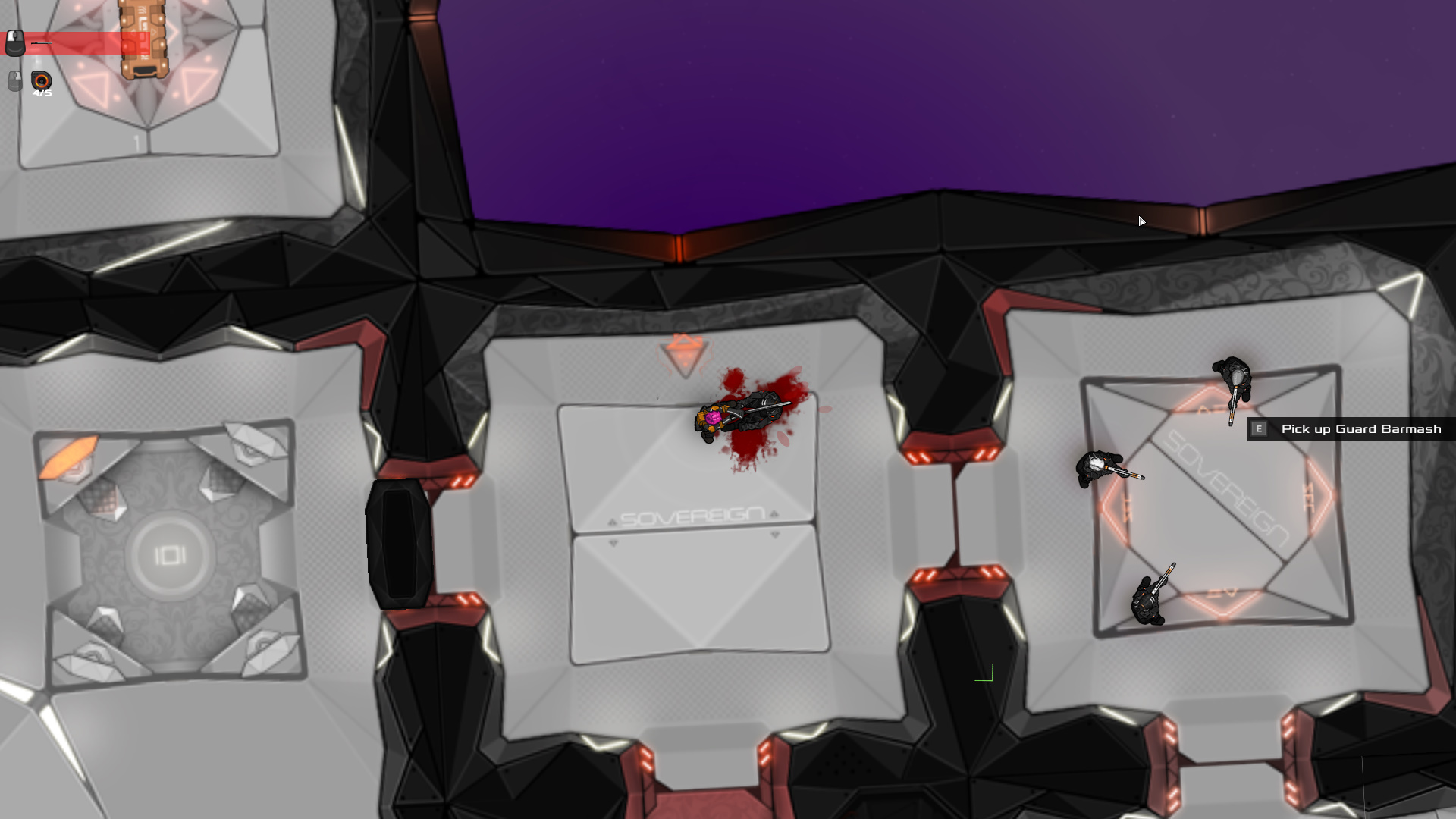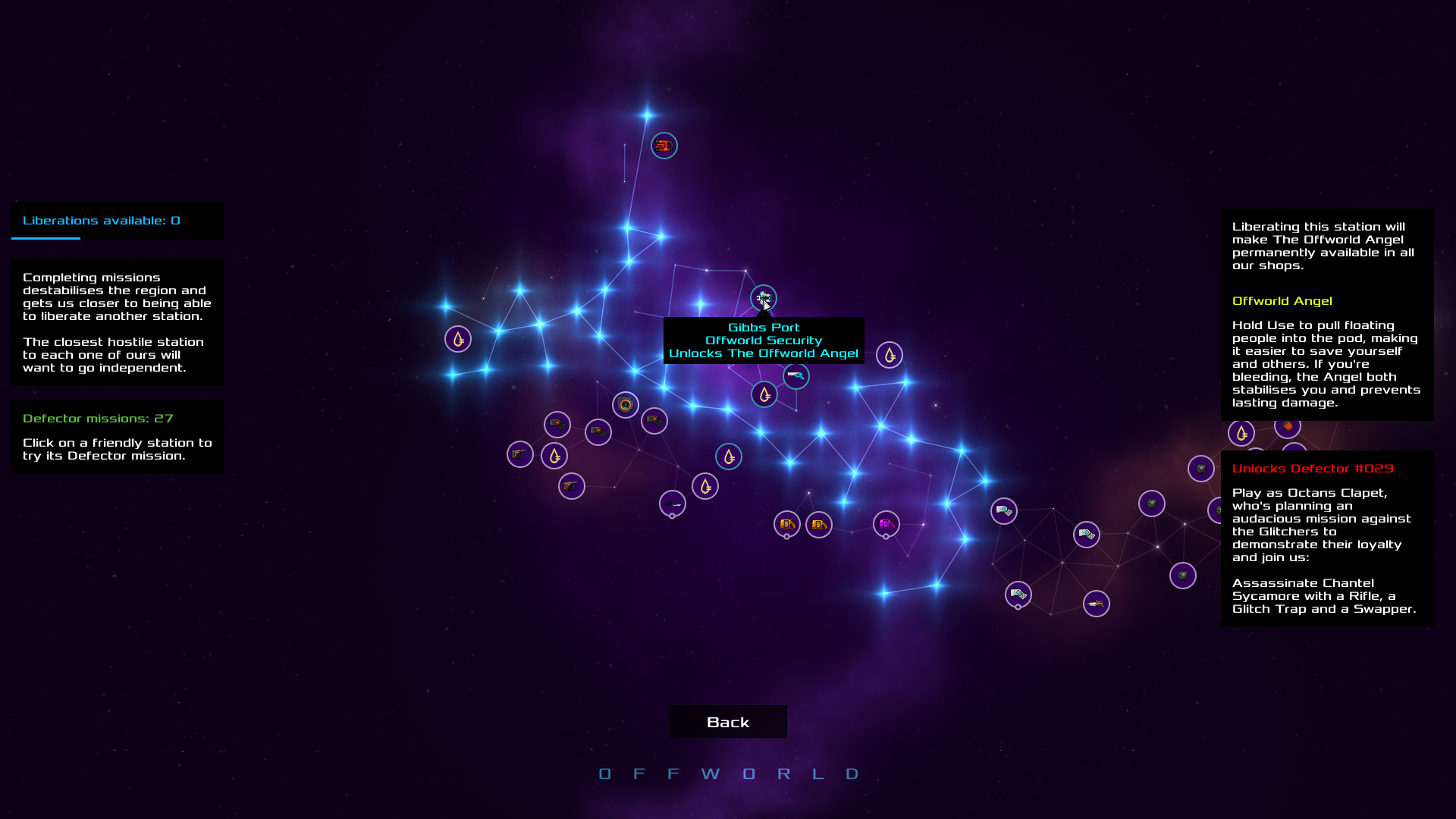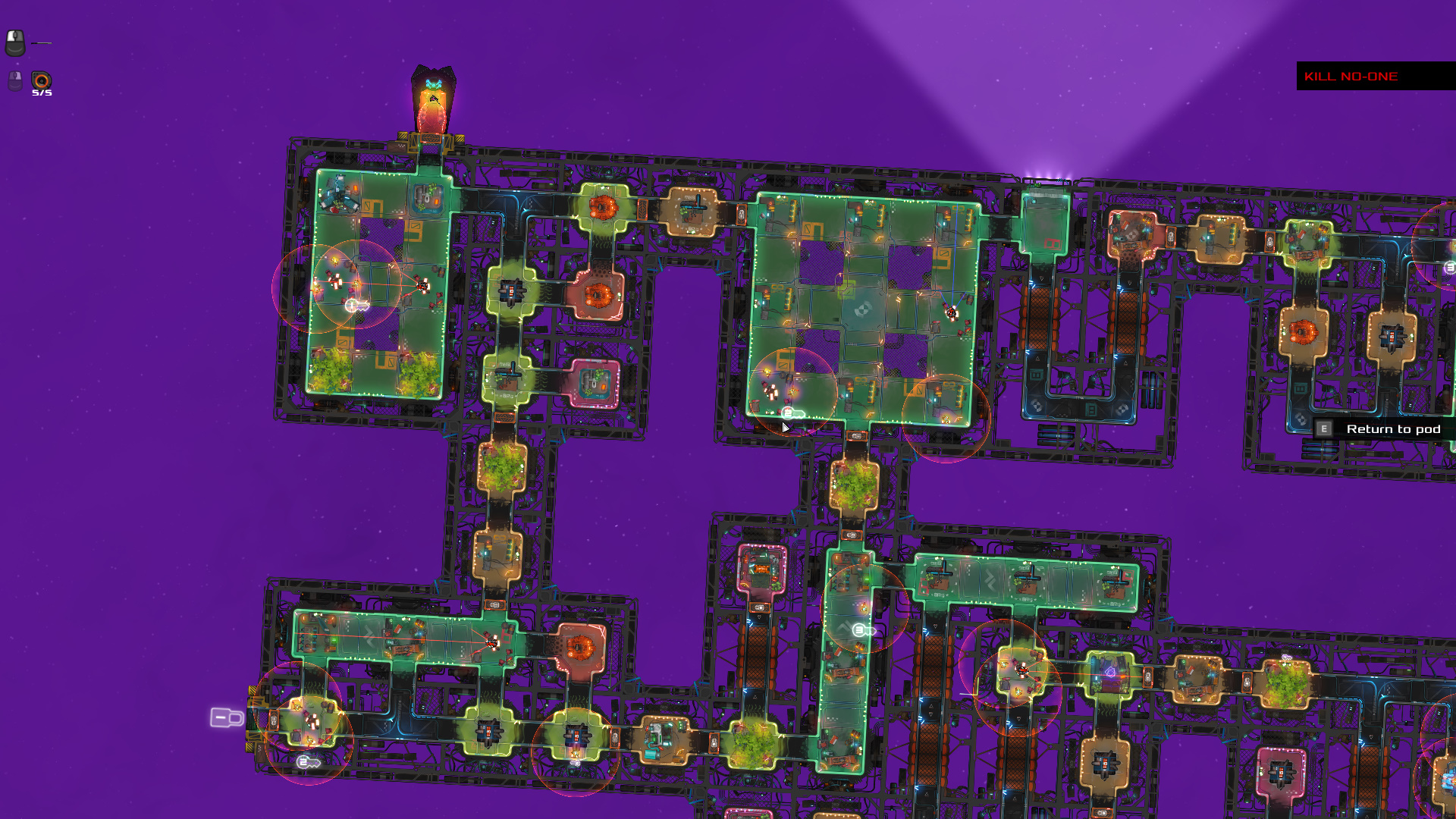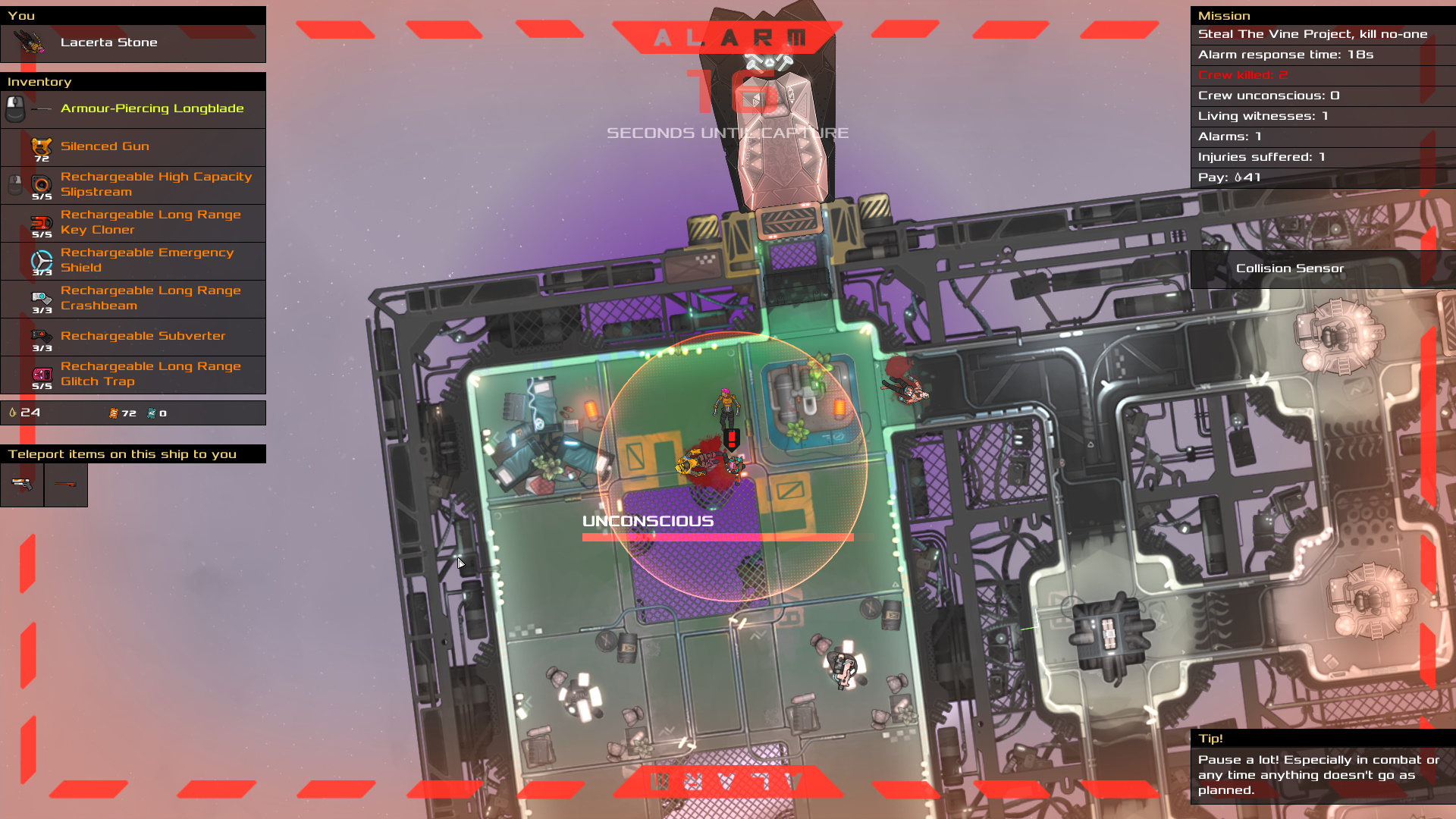Our Verdict
By making excellent use of its procedurally generated world and wacky gadgets, Heat Signature is a mission worth taking.
PC Gamer's got your back
What is it? A 2D stealth game about sneaking around ships using fun gadgets.
Reviewed On: Windows 10, i5 3570k, 16GB Ram, GTX 970
Price: $15/£11
Release Date: Out now
Publisher: Suspicious Developments
Developer: Suspicious Developments
Multiplayer: None.
Link: Official Website
Buy it: Steam
I smashed an unsuspecting guard so hard with a Concussion Hammer that his body went sliding down the corridor, comically coming to a stop at the feet of four of his peers. Oops, I thought. As the four other guards immediately began shouting and attacking, the spaceship's captain changed course for a safe station just 30 seconds away. I hadn't even gone more than four rooms without bungling the mission, and now I had just half a minute to salvage it before my character was captured. I never expected being my time as a space-faring rogue in Heat Signature would be so full of hilarious, little surprises.
Fortunately, the captain was only a few rooms away. I could get to him easily—assuming nothing else went wrong. Using my Sidewinder, I teleported into the middle of the group of guards. They turned to me and opened fire. I paused, switched gadgets to my Emergency Shield, and activated it. In the split second between their bullets leaving their guns and hitting me, the shield switched on and deflected the rounds back at them. It was a bloodbath. Then, using my Long Range Key Cloner, I nabbed the passkey I needed from a guard several rooms away and entered the bridge. The mission was saved.
I've lost count of how many of these moments I've experienced. Moments when my carefully laid plan crumbles to dust and I'm forced to make use of the pause feature to survey the situation and find some new path forward. Heat Signature is a wonderful procedurally-generated playground for those who love to experiment, fail, and adapt.
Viva la revolution
Though it kind of looks like Hotline Miami, Heat Signature shares more DNA with Dishonored 2 except set in a procedurally generated sandbox galaxy. If that sounds ambitious for a game built in GameMaker, well, it is. At any time, even during a mission, other ships are zooming from station to station. During one mission, another ship attacked the one I was infiltrating, turning a stealthy theft into a frantic race to get the item and get out before a missile wiped me out.

There is no real overarching narrative to Heat Signature—not one that I was bothered to care about, anyway. There's four big empires that rule the galaxy and you're part of a group of revolutionaries trying to overthrow them. To do this, you infiltrate their ships and murder, kidnap, and steal. There are some characters and story there to try and spice it up, but none of it was engaging enough to make me interested. The fun is solely found in unlocking new gadgets and testing my mettle by tackling progressively deadlier missions.
That the map is also a tech tree is one of Heat Signature's best ideas.
There are plenty of unique ideas in Heat Signature. For one, you don't play as a single character but a revolving door of randomly generated mercenaries. When one dies or is captured, you're forced to pick a new recruit. Each of these characters has their own personal score to settle against one of the empires in the form of a personal mission, but their collective efforts also help convince nearby space stations to abandon their empire and join your cause. Doing so unlocks new gadgets to be bought with your earnings from completing missions. That the map is also a tech tree is one of Heat Signature's best ideas. Each empire has its own unique gadgets, like the Glitchers using teleporters, so I had to focus on what tech I wanted to unlock first as the expense of other options.

When I first started playing, I stuck to easy missions to board ships that had only a few poorly equipped guards. I'd set out from my station in my 'pod,' a specialized ship that attaches to the airlocks of bigger vessels like a tick, and be back home in only a minute or two. Even with just a wrench, it was easy to make my way through the randomly generated corridors, knocking out guards en route to my objective.
But, now nearing 20 hours of playtime, Heat Signature's challenge is daunting. Guards come equipped with shields and armor and cluster together in groups. Sometimes they'll explode upon death or can immediately teleport to suspicious noises. Sentry guns lock down entire corridors and special mission modifiers might reward me with extra pay if I adhere to restrictions like not raising any alarms or leaving any witnesses alive.
It's when Heat Signature is the most difficult that it often spawns the best anecdotes. Like Spelunky, sometimes a simple interaction can have surprising consequences. One time I fired a grenade into a group of guards and when it exploded, it caused one of their guns to ricochet off a wall and accidentally discharge. The bullet whizzed into the adjacent room I was in and struck the fuel cell behind me. This all happened in the span of a second and I only noticed what went wrong because the fuel cell was glowing. I didn't have enough time to run from the impending explosion so I turned on my Emergency Shield to survive the blast but promptly found myself sucked out into space as the whole room exploded.
I really enjoy that, in service of fun and experimentation, Heat Signature is quite forgiving. Getting hit once knocks you unconscious, but guards always toss you out of the airlock rather than finish you off. That gives you a moment to remote control your pod and scoop your body back up to try again—albeit with less time should you be injured again. But once you finally die, you and your gear are gone for good, and you have to continue the game with a new character.

If you're captured, new recruits will often spawn with a personal mission to rescue you, letting you continue playing as the captured character. There's even a cool feature where your characters might appear in your Steam friends' games for them to rescue and play with.
But rarely is being killed or captured an unexpected consequence. In the heat of action—or when things have gone wrong—I can always pause and plan my next step. Fights in Heat Signature have this pleasing stop-go pacing of split second action followed by seconds of careful consideration. This minute focus is very satisfying. I'd smack a guard with a wrench, pause, switch to a gun, shoot another, pause, teleport behind a third guard, pause, and lay a Glitch Trap at his feet that would teleport him to the cold vacuum outside the hull of the ship, leaving him to suffocate as his oxygen ran out. Despite that, I do wish the enemy AI was more challenging. They always patrol and move predictably and sometimes it was either to undermine a difficult mission just by picking them off one by one while on patrol.
Gadgets and gizmos a'plenty
Despite the boring AI, Heat Signature's missions and pausable combat are enjoyable because of the dizzying variety of tools you can use. Sure, storming a ship with only a wrench is fun once or twice, but I love using Subverters to turn my enemies' shields against them so that bullets are deflected on the inside instead of the outside. Seeing a guard murdered by his own shotgun blast as it ricochets inside his shield is hilarious.
Teleporters are another great gadget that I frequently make use of. Swappers can let me switch places with a guard while Visitors let me jump to one room for two seconds before snapping back. You can get pretty creative with these tools as well, like the time I used a Visitor to teleport outside the hull of a ship and then a Swapper to switch places with my assassination target.

Stealth shields, electronics-disabling Crash Beams, room-destroying breach charges—the list goes on and on. Any of these items can be found in loot boxes on a ship, but once you unlock the appropriate station they'll always be available for purchase. Different stations might also unlock variants with more uses, longer reach, or rechargeable ammo. And because the galaxy is randomly generated, what gear you'll have access to first is also random.
My only major complaint is that Heat Signature obviously pushes the limits of GameMaker. Slowdowns happen every so often and I experienced several crashes to desktop. Because missions are usually only a few minutes long, I never felt like I lost too much progress. It's still frustrating, though.
Once you start to unlock the most powerful gadgets, the intimidating threat that some missions initially pose erodes.
And while I do enjoy the cycle of liberating stations to unlock more gear, it did begin to feel like a grind with no real endgame to look forward to. Once you start to unlock the most powerful gadgets, the intimidating threat that some missions initially pose erodes, and the thrill begins to die. Each liberated station offers Defector Missions which add a fun challenge by restricting what gadgets you can use. They're a great way to learn creative combos I hadn't thought of, like how to kill a room full of guards using only an Emergency Shield. But they ultimately feel like a distraction from a core campaign that struggles to entice after 15 hours.
Still, those 15 hours are a great time. Heat Signature inspires creativity through emergent complexity like any great immersive sim. I can't stop regaling friends with my stories of heists gone bad or boasting about my flashes of brilliance in the heat of the moment. Heat Signature is brilliant at teasing these anecdotal threads out of a procedural universe.
Disclosure: Heat Signature creator Tom Francis was an editor at PC Gamer for 10 years, leaving in 2013 after the release of his first game, Gunpoint. Tom occasionally contributes guest articles to PC Gamer. For Heat Signature, we assigned a writer and editor who do not have personal relationships with Tom, and none who do have consulted on this review's contents or score.
By making excellent use of its procedurally generated world and wacky gadgets, Heat Signature is a mission worth taking.
With over 7 years of experience with in-depth feature reporting, Steven's mission is to chronicle the fascinating ways that games intersect our lives. Whether it's colossal in-game wars in an MMO, or long-haul truckers who turn to games to protect them from the loneliness of the open road, Steven tries to unearth PC gaming's greatest untold stories. His love of PC gaming started extremely early. Without money to spend, he spent an entire day watching the progress bar on a 25mb download of the Heroes of Might and Magic 2 demo that he then played for at least a hundred hours. It was a good demo.



